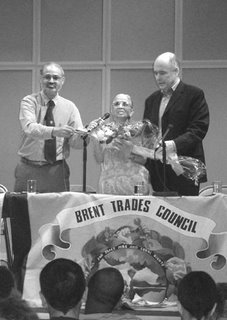
by Rob Laurie
LAST SUNDAY Brent Trades Union Council organised a commemoration of the 30th anniversary of the epic two year Grunwick strike. In August 1976 a small group of unorganised Asian workers walked out of their low paid jobs at a north London film processing factory in protest at being denied union recognition by their ruthless boss, George Ward.
The workers soon joined APEX (now part of GMB) and were greatly assisted by Brent Trades Council, then chaired by the late Tom Durkin, the legendary building workers’ leader and whose secretary was Jack Dromey, who is now deputy general secretary of the Transport and General Workers’ Union.
Grunwick’s was a postal business, so it was badly damaged by the boycott of its mail by the postal workers, who supported the strike.
The misnamed National Association For Freedom took legal action to force the postal union to drop the boycott in return for negotiations with the conciliation service ACAS.
It soon became clear that George Ward merely saw this as a stalling tactic and continued to oppose recognition. The pickets remained at the factory gates their numbers increasing.
In June 1977 the 250-odd pickets were attacked by police and 84 arrested.This did not deter the trade union movement, but only served to multiply the number of pickets to 3,000 by the end of the week.
These pickets included miners from South Wales and Yorkshire, the latter lead by Arthur Scargill. The bourgeois media took fright at this wave of support for the workers and the leadership of the unions began to get cold feet.
The leadership of postal workers forced the local postmen to abandon their boycott. The Labour government launched a Court of Inquiry which would divert the struggle from the streets to the courts.
This did dot deter the Strike Committee from holding a 12,000 strong mass picket on the 11th July, but this proved to be the high water mark of the dispute.
The Court of Inquiry, which reported in late August, largely supported the strikers but Grunwick’s boss, supported by the Tory Party, repudiated it.
The national union leaderships made every effort to prevent mass action but the local strike committee organised mass pickets in November.
The strikers held a hunger strike outside the TUC on the day the GeneralCouncil met. War weariness set in among even the most militant supporters.Legal procedures proved ineffective in forcing George Ward to recognise unions.
The lessons of the dispute are clear: the workers can never depend on the courts to secure their rights. The legal environment was much friendlier into trade unions in 1976 than it is in 2006, but still the battle was lost.
While the workers ultimately failed to achieve their objectives they were not defeated in any meaningful sense. The workers speedily learned a great deal about trade union organisation and they have served as an inspiration to countless other black workers.
The dispute was a turning point for the trade union movement in that it developed a militant unity between black and white workers.
Sunday’s commemoration brought together a number of veterans of that dispute. Prominent personalities such as former miners’ leader Arthur Scargill and Jack Dromey shared the platform with local postal workers’leader Derek Walsh, but the star turn was however the original leader of the walkout, Jayaben Desai.
The event did not focus entirely on the historical aspects of the dispute.After a delicious Indian lunch there were two separate workshops focused on the continuing struggle trade union rights and those on migrant workers.
John Hendy QC, the author of the present Trade Union Freedom Bill, recalled being on the Grunwick picket line, in particular the sight of the famous labour lawyer John Platt-Mills turning up in pinstripes and bowler hat.
Hendy stressed the limited aims of the Trade Union Freedom Bill which he saw as an essential first step in restoring the rights of British workers tothose required by the United Nations charter.
In the latter session two women involved in the recent Gate Gourmet dispute at London Airport accused the TGWU of betrayal. This brought a sharp rebuke from Jack Dromey who described the considerable resources devoted by his union to organising migrant workers, including employing a large number of ethnic organisers who deal with migrant workers in their own language.
Brent Trades Council has produced two lasting souvenirs of these events.They have reprinted a pamphlet first published in 1978 by Tom Durkin aptly entitled Grunwick: bravery and betrayal; it costs £2.00. They have also given fresh life to two contemporary films of the strike by putting them out on a single DVD entitled The Grunwick Strike 1976-1978 which retails for a bargain £6.00. Both these can be obtained from Brent Trades Union Council,375 High Street, Willesden, London NW2 2JR, who will doubtless welcome acontribution towards postage and packing.
No comments:
Post a Comment